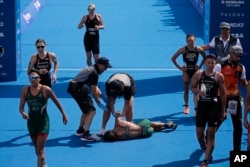Fans of long-distance racing might not be able to see the marathon event next year at the 2020 Summer Olympic Games in Tokyo, Japan.
Instead, they might have to travel to Sapporo on Hokaido Island -- 832 kilometers away.
The International Olympic Committee (IOC) on Wednesday released its proposal to move the marathon and long-distance race walking events to Sapporo. The change was announced quickly -- with little discussion with local organizers or government officials.
Sapporo officials are excited by the proposal to move next year’s events to the northern Japanese city.
“We take this as an honor,” Sapporo Mayor Katsuhiro Akimoto said.
That was not the case in Tokyo, however. It seemed to catch officials there by surprise.
Tokyo Governor Yuriko Koike was not happy on Thursday.
“We are very surprised to learn of this sudden change of direction,” she said. She noted the effort that municipal governments had made to organize the race.
Koike, however, did not disagree with the IOC’s reasoning for the change. The Olympic Committee noted Tokyo’s especially hot weather and athlete’s safety.
The IOC wrote: “In Sapporo, temperatures during the Games period are as much as five to six degrees centigrade cooler during the day than in Tokyo.”
The hope is that the cooler temperatures will reduce “stress” on the runners.
Koike said, “Of course, the athletes-first approach is extremely important.”
Sapporo is not new to the Olympics. It hosted the 1972 Winter Olympic Games. The city also has expressed interest in holding the 2030 Winter Games.
This week’s unexpected move could be a first step.
“I think this could pave the way for us,” Sapporo’s mayor said.
Why officials proposed the change
Olympic officials have acted because of results from the recent World Track and Field championships, held last month in Doha, Qatar.
In the women’s marathon event, 28 of 68 competitors who started the race failed to finish. In the men’s race, 18 of 73 failed to complete the course. This happened even with the races being held at midnight, when the weather was cooler. The temperature was still 38 degrees C at the time, however.
Ethiopian distance-running great Haile Gebrselassie said athletes “could have died” in the women’s race.
The marathons in Tokyo were to start at 6 in the morning to ease the heat effect on runners. The men’s 50-kilometer race walk final was expected to start at 5:30 in the morning.
Tokyo governor Koike said she wants the IOC to explain the decision “to all of the games’ stakeholders, including the citizens of Tokyo.”
A report released last year by the national government’s Board of Audit said Japan is likely to spend $25 billion to prepare for the games. Much of the total is public money, except for the $5.6 billion in the privately funded operating budget.
However, organizers dispute that amount. They say it is about $12 billion. There is a heated debate over which costs are directly related to the Olympics and which ones are not.
Tokyo estimated a total cost of about $7.5 billion when it won the right to hold the games in 2013.
I’m Mario Ritter, Jr.
Mario Ritter Jr. adapted this Associated Press report for VOA Learning English. Ashley Thompson was the editor.
________________________________________________________________
Words in This Story
pave the way –idiom to make it easier for something to happen
municipal –adj. related to the government of a city or town
centigrade –adj. a scale that goes from 0 to 100; the same as Celsius
stakeholder –n. a person or business that has invested money in something
We want to hear from you. Write to us in the Comments section, and visit our Facebook page.






